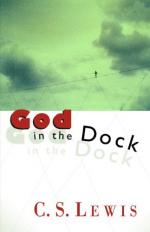
|
| Name: _________________________ | Period: ___________________ |
This test consists of 5 multiple choice questions, 5 short answer questions, and 10 short essay questions.
Multiple Choice Questions
1. According to Lewis, how much of Jesus' life is recorded?
(a) Not enough.
(b) His entire life.
(c) Nine years.
(d) Only about two months.
2. How do secularism and paganism compare to Christianity as belief systems, according to Lewis?
(a) Paganism is inferior to Christianity, which is inferior to secularism.
(b) They are both totally invalidated by Christianity.
(c) They are both equally valid compared to Christianity.
(d) They are both inferior to Christianity.
3. In Part I, Essay 8, "Laws of Nature", what was the woman praying for her son to survive?
(a) Terminal cancer.
(b) A surgery.
(c) Injuries from a car crash.
(d) A battle.
4. What role does dogma play in a religion, according to Lewis?
(a) It helps to propagate it.
(b) It prevents free thought.
(c) It ties its identity together.
(d) It suppresses dissent.
5. According to Lewis, what is the proper way to make probability judgments about events in Christianity?
(a) According to a sliding scale.
(b) According to modern science.
(c) According to a bell curve of unlikely events.
(d) According to the actions of God.
Short Answer Questions
1. What justification does Joad give for his preference of belief in Part I, Essay 1, "Evil and God"?
2. Pittenger does not believe there is a scriptural basis for which of Jesus' claims?
3. What was Lewis' intent in his original writings about the pain of animals?
4. The philosopher that Lewis responds to in Part I, Essay 23, "Must Our Image of God Go?" uses a metaphor that compares Jesus to which of the following?
5. According to Lewis, how do many Westerners react to miraculous experiences?
Short Essay Questions
1. What is the purpose of the prayer books according to Lewis?
2. Explain Lewis' argument that science does not undermine the occurrence of miracles.
3. According to Lewis, how are laws of nature, causes, events, and the creator related?
4. Why does Lewis believe that pain is evidence of the existence of God?
5. Explain the distinction that Lewis makes between thinking and imagining.
6. What is the theory of dualism?
7. According to Lewis, what distinction does Christianity carry, compared to other religions?
8. Why does Lewis believe that philosophy alone is insufficient for faith?
9. Why does Lewis believe that the gospels are not legend?
10. What is the difference between religion and politics, according to Lewis?
|
This section contains 749 words (approx. 3 pages at 300 words per page) |

|




